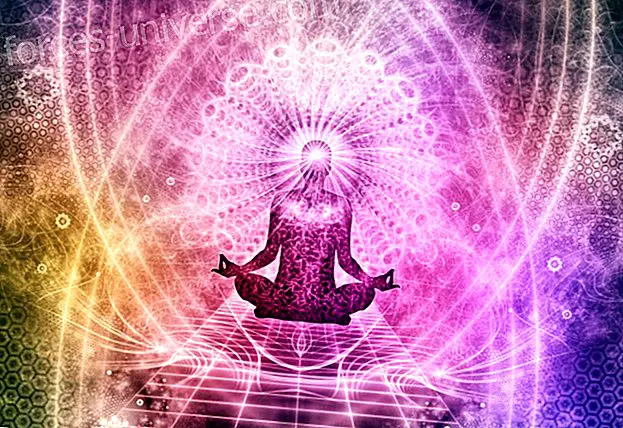
 "We are less free than we think, says Anne Ancelin, but we have the possibility of conquering our freedom and leaving the repetitive destiny of our history if we understand the complex bonds that have been woven into our family." Your method? The "contextual transgenerational psychogeneological therapy", whose first mission is to strengthen the encirclement of our "invisible loyalties" that force us to "pay debts" for our ancestors, whether we want it or not, whether we know it or not. As he writes in ¡Ay mis ancestros !: “The life of each one of us is a novel. You, I, live prisoners of an invisible spider web of which we are also one of the directors. If we teach our third ear, our third eye, to better understand, to hear, to see these repetitions and these coincidences, the existence of each of us would be clearer, more sensitive to who we are, to what we should be . You are a psychoanalyst, but when you receive a patient, you are very little interested in his individual history: he asks you to give him information about the life of his ancestors. It makes you write dates. How has it come to transform the development of the cure? In the seventies, I was going to analyze at home a young Swedish woman of thirty-five who was evicted from cancer. The doctors had just amputated a part of his foot and prepared, helplessly, to amputate even more. Since I was a psychoanalyst, I asked this woman to free her mind and tell me everything that went through her head. As you know, this exercise could have been developed for ten years. There was a portrait of a young woman on the living room wall. My patient told me it was his mother, dead of cancer at the age of thirty-five. Well, I don't know why, that day, this double coincidence of age and illness left me dumbfounded. Suddenly I had the impression that this woman had been programmed to fall ill at the same age as her mother had died of cancer. What prevented you from thinking about the disease as a simple coincidence? More like a genetic transmission? That is the difficulty that arises for everything that concerns the unconscious, invoking chance as a cause. As for genetics, I could hardly match dates to that point. Especially since this story immediately reminded me of another one I remembered that one day my daughter had told me: Do you realize mom, you are the oldest of two children and the second is dead; Dad is the oldest of two children and the second is dead; I am the oldest of two children and the second is dead. This had been a first shock. This time, I told myself that I was going to verify with other patients what I intuited about this woman. He asked everyone to draw his family tree and, if possible, indicate under the name of the ancestors the most important moments in family history. Tuberculosis of the grandfather, marriage of the mother, car accident of the father. They also asked them to put the age and date on which such events had occurred. Genealogical trees revealed amazing repetitions to me: a family in which women, leukemic, died for three generations in the month of May; a five-generation succession in which women became bulmatic at the age of thirteen; a genealogy in which men were victims of a car accident on the day of the first class trip of their first child. How can such repetitions be explained? Why do we repeat things lived by our parents or by our ancestors? Repeating the same facts, dates or ages that have shaped the family drama of our ancestors is for us a way to honor them and to be loyal to them. This loyalty is what pushes a student to suspend an exam, with the unconscious desire not to be above his father socially, or to continue to be a manufacturer of music instruments from father to son or, for women of a same genealogical line, marry at eighteen to give birth to three children and, if possible, girls Sometimes, this loyalty exceeds the limits of What do you see: do you know the story of the death of actor Brandon Lee? He was killed during a shoot because, unfortunately, someone had left a bullet forgotten in a revolver that should be loaded with bullets.
"We are less free than we think, says Anne Ancelin, but we have the possibility of conquering our freedom and leaving the repetitive destiny of our history if we understand the complex bonds that have been woven into our family." Your method? The "contextual transgenerational psychogeneological therapy", whose first mission is to strengthen the encirclement of our "invisible loyalties" that force us to "pay debts" for our ancestors, whether we want it or not, whether we know it or not. As he writes in ¡Ay mis ancestros !: “The life of each one of us is a novel. You, I, live prisoners of an invisible spider web of which we are also one of the directors. If we teach our third ear, our third eye, to better understand, to hear, to see these repetitions and these coincidences, the existence of each of us would be clearer, more sensitive to who we are, to what we should be . You are a psychoanalyst, but when you receive a patient, you are very little interested in his individual history: he asks you to give him information about the life of his ancestors. It makes you write dates. How has it come to transform the development of the cure? In the seventies, I was going to analyze at home a young Swedish woman of thirty-five who was evicted from cancer. The doctors had just amputated a part of his foot and prepared, helplessly, to amputate even more. Since I was a psychoanalyst, I asked this woman to free her mind and tell me everything that went through her head. As you know, this exercise could have been developed for ten years. There was a portrait of a young woman on the living room wall. My patient told me it was his mother, dead of cancer at the age of thirty-five. Well, I don't know why, that day, this double coincidence of age and illness left me dumbfounded. Suddenly I had the impression that this woman had been programmed to fall ill at the same age as her mother had died of cancer. What prevented you from thinking about the disease as a simple coincidence? More like a genetic transmission? That is the difficulty that arises for everything that concerns the unconscious, invoking chance as a cause. As for genetics, I could hardly match dates to that point. Especially since this story immediately reminded me of another one I remembered that one day my daughter had told me: Do you realize mom, you are the oldest of two children and the second is dead; Dad is the oldest of two children and the second is dead; I am the oldest of two children and the second is dead. This had been a first shock. This time, I told myself that I was going to verify with other patients what I intuited about this woman. He asked everyone to draw his family tree and, if possible, indicate under the name of the ancestors the most important moments in family history. Tuberculosis of the grandfather, marriage of the mother, car accident of the father. They also asked them to put the age and date on which such events had occurred. Genealogical trees revealed amazing repetitions to me: a family in which women, leukemic, died for three generations in the month of May; a five-generation succession in which women became bulmatic at the age of thirteen; a genealogy in which men were victims of a car accident on the day of the first class trip of their first child. How can such repetitions be explained? Why do we repeat things lived by our parents or by our ancestors? Repeating the same facts, dates or ages that have shaped the family drama of our ancestors is for us a way to honor them and to be loyal to them. This loyalty is what pushes a student to suspend an exam, with the unconscious desire not to be above his father socially, or to continue to be a manufacturer of music instruments from father to son or, for women of a same genealogical line, marry at eighteen to give birth to three children and, if possible, girls Sometimes, this loyalty exceeds the limits of What do you see: do you know the story of the death of actor Brandon Lee? He was killed during a shoot because, unfortunately, someone had left a bullet forgotten in a revolver that should be loaded with bullets. 
 Now, just twenty years before that accident, his father, the famous Bruce Lee, had died in full shooting, of a cerebral hemorrhage, during a scene in which he had to play the role of a character accidentally killed by a revolver that should having been loaded with bullets .. We are literally driven by a powerful and unconscious fidelity to our family history and we have great difficulty inventing something new in life! In some families, we see that the anniversary syndrome is repeated - in the form of diseases, deaths, natural abortions or accidents - in three, four, five or sometimes eight generations. But there is a more intricate reason why we repeat diseases, as well as accidents of our ancestors. If we take any family tree, we see that it is full of violent and adultery deaths, secret anecdotes, bastards and alcoholics. These are things that are hidden, secret wounds that you don't want to show. Now, what happens when, for shame or convenience, we don't talk about incest, about a suspicious death, about grandfather's failures? The silence that is made about an alcoholic uncle, will create a shadow zone in the memory of a son of the family, who to fill that void and fill the gaps, will repeat in his body or in his existence the drama that he is trying to hide . In a word, he will be an alcoholic like his uncle. But this repetition assumes that this boy knows something about this family shame and that he has heard something about his unfortunate uncle ... right? Of course not! Shame does not need to be evoked at all to pass the barrier of generations and come to disturb a weak link in the family. I'm going to give you an example of a four-year-old girl who, in her nightmares, is chased by a monster. He wakes at night coughing and, every year, by the same date, his cough degenerates into an asthmatic crisis. It's April 26, the mother tells me. I know the dates of the history of France (many ancestral injuries find their origin in the persecutions or on the battlefields). On April 26, 1915, German troops fired toxic gas on French lines for the first time. Afterwards, thousands of French military from the First World War perished asphyxiated. Grandpa's brother was one of those soldiers. I ask the girl to draw the monster she sees in her nightmares. She draws a gas mask from the war of 1914-1918 with a pencil. However, he had never seen a gas mask and had never been told anything about the grandfather's suffocation. Despite all these obstacles, the information could pass. How? Maybe because he wanted to avoid it. The memory of the poorly buried dead created in the mother an area of shadow in which the pain was hidden. Hypothesis: throughout his life, there will have been gaps in the way of talking about this woman; every time he has found the occasion to think about his grandfather's brutal death (a family photo, a picture of war on television), he will have expressed a shock that will undoubtedly have been expressed first in the look, in the voice or in attitudes rather than in the content of the words that I could have exchanged. He will have avoided watching any war movie ... He will have spoken badly about Belgium ... He will have been afraid of gas ... Do you mean that images, or family secrets, pass from one generation to another by telepathy? No. For the mother-child dual unit. I believe that during his development in the womb, the child dreams as his mother dreams and that all images of the maternal unconscious and the family co-unconscious can thus impress the memory of the child to be born. This hypothesis has not yet given rise to any serious scientific exploration. However, we are doing health! Fidelity to our ancestors would govern us ... Our unconscious would urge us to honor it and, for that, it would use surprising means: to cause cancer, to send us under the wheels of a car. Could this be explained in medical terms? Actually, this form of curse comes from a mechanism that medicine knows better and better. Every death or idea of death causes a depression in man. Losing your own home or your job is also a duel. Entering the sadness of mourning decreases immunology. Many people think in a totally unconscious way that they are going to die at a specific age: "My mother died at thirty-five and I will not exceed that age, " the woman says. At the expected age, he falls into a depression that weakens his immune system to the point of giving rise to cancer. It is the same mechanism for the car accident: when the anniversary date of a trauma that has been forgotten in the family arrives, someone can begin to take a risk in a senseless manner and the accident obviously occurs. The unconscious takes care of all that, as if it were an invisible clock. Can it be avoided? Can you leave the repetition to be born freely to the story itself? To heal from repetition, you must first be aware of it. Remember the young Swedish. When I helped her realize that if she succumbed to her cancer, there would be no one left to put flowers on her mother's grave, there was a radical change in her illness. He stopped having symptoms, returned to enjoy more energy and gain weight, regained his work and a normal life. If the origin of evil is close to consciousness, visualizing the family tree and realizing the repetition can free the patient from the weight of unconscious family loyalties. Personally, only by having someone draw his family tree, he got to update in six hours what he could do before in ten years when a person was on the couch! But sometimes it also happens that the secret is so hidden that awareness does not give anything. Then you have to resort to psychodrama. Because it helps to relive the emotion of what was hidden and erase the tension that could have been born between what is hidden from us and what, however, we have sensed. Speaking, crying, shouting, hitting, prevent the conversion of psychic disease into a somatic symptom, so it needs to be put on stage, represented. During a consultation, I can invite a man to play the trumpet in a bloody episode of the battle of Sedan, standing on the carpet, next to the couch. I have him interpret the great-grandfather's death on the battlefield. The twentieth century has been the century of the Hecatombs. For the first time in our history, millions of men have been buried - often without burial - away from their homeland and away from their ancestors. Could one speak here of a huge transgenerational malaise in our civilization? When it is known that a poorly buried dead prevents the family from grieving properly, it is easy to imagine that a catastrophe can generate immense discomfort in our civilization, indeed. And I don't count the children of Jews deported to concentration camps that suffer asthmatic crises, eczema and violent migraines on the anniversary dates of deportation. I believe that therapeutic work can also be done at the level of peoples and nations. When an ancestor has suffered, it is essential for the offspring that their pain be recognized. It was very important for the Armenians to see their genocide recognized recently by the international community, even fifty years later. You had to kill the ghost. And I bet that millions of Armenians have been appeased in the depths of their being. That said, no such dramatic circumstances are necessary for the repetition syndrome to deteriorate the existence. For example, among the many people who have come to my office because they were suffering from unexplained psychosomatic disorders, there are some of them who have repetitive nightmares that systematically suspend their exams and throw their professional lives on the ground. I think of a young man with whom I discovered that since the end of the 19th century, fourteen of his cousins had suspended high school. We approached the origin of this disorder and finally we found that this boy's great-grandfather had been expelled from his house on the eve of high school because he had slept with the maid and she had become pregnant. Well, the great-grandson still carried the weight of this "original fault" carefully hidden by the whole family. How to explain the current admiration for transgenerational therapy? We are experiencing a period of radical transformation of our environment and our way of thinking, of our life environment and its context. Many therapists are confronted with difficult cases that classical theories do not explain or explain badly. Allowing a rooting of the person in their own history is part of the solutions. Can you give us an example of debt in family accounts? The most important debt of family loyalty is that of each child towards his parents for the love, affection, fatigue and considerations he has received from birth to the moment he becomes an adult. The way to pay this debt is transgenerational, that is, what we have received from our parents, we give it to our children, etc. But it happens that there are unhealthy distortions between merits and debts. Take a classic example: in a certain number of families, the eldest daughter supports the role of mother of the other children and sometimes of her own mother who, in that case, is helped, cared for and supported by her daughter. It is what is called parentification. A child who has to become a father when he is very young has an imbalance in relation to the significant one. In reality, it is difficult to understand the transgenerational ties, the book of merits and debts, because there is nothing clear. Each family has its way of defining family loyalty. But the transgenerational study can provide another decisive point of view. In your work you insist on the vital importance of family rules Let's cite some rules that we often find. There are families for caregivers / caregivers: some members take care of others who are sick. Also families in which the rule is to do anything so that the child studies the eldest will not be the eldest of The children but the first child. There are families in which an eldest son is thus made to take care of family businesses. In other families, several generations systematically cohabit under the same roof. When looking at a genosociogram, it is important to see well what rules are in effect and who develops them. It can be a grandfather, a grandmother, an uncle. When we begin to perceive these rules well, we can try to help the family achieve a better functioning relationship and that each of its members has a better balance between debts and merits. It is not always easy to understand everything when deciphering a family. You have also been interested in school failure that you will often be of a transgenerational order. In the case of school failure, we must add the socio-economic aspect of these family loyalties brilliantly analyzed by Vincent de Gaul jac, who has opened my eyes wide. He shows to what extent it is difficult for a good son or a good daughter to exceed his father's level of education; for example, he will become ill on the eve of the exam or will have an accident when he goes to the place where the exam is performed. In doing so, he unconsciously responds to the doubly pressing message of his father (or his mother): Do like me, but above all do not do like me! Or: Har anything for You and I want you to succeed, but it gives me a terrible fear that you will surpass me and leave us. Now, those messages and failed acts date, most of the time, from previous generations. There we are also governed by fidelity to the ancestors even if it is unconscious or invisible. What then remains of free will? All. Because we have been given the choice to free ourselves from repetition to be born into our own history.
Now, just twenty years before that accident, his father, the famous Bruce Lee, had died in full shooting, of a cerebral hemorrhage, during a scene in which he had to play the role of a character accidentally killed by a revolver that should having been loaded with bullets .. We are literally driven by a powerful and unconscious fidelity to our family history and we have great difficulty inventing something new in life! In some families, we see that the anniversary syndrome is repeated - in the form of diseases, deaths, natural abortions or accidents - in three, four, five or sometimes eight generations. But there is a more intricate reason why we repeat diseases, as well as accidents of our ancestors. If we take any family tree, we see that it is full of violent and adultery deaths, secret anecdotes, bastards and alcoholics. These are things that are hidden, secret wounds that you don't want to show. Now, what happens when, for shame or convenience, we don't talk about incest, about a suspicious death, about grandfather's failures? The silence that is made about an alcoholic uncle, will create a shadow zone in the memory of a son of the family, who to fill that void and fill the gaps, will repeat in his body or in his existence the drama that he is trying to hide . In a word, he will be an alcoholic like his uncle. But this repetition assumes that this boy knows something about this family shame and that he has heard something about his unfortunate uncle ... right? Of course not! Shame does not need to be evoked at all to pass the barrier of generations and come to disturb a weak link in the family. I'm going to give you an example of a four-year-old girl who, in her nightmares, is chased by a monster. He wakes at night coughing and, every year, by the same date, his cough degenerates into an asthmatic crisis. It's April 26, the mother tells me. I know the dates of the history of France (many ancestral injuries find their origin in the persecutions or on the battlefields). On April 26, 1915, German troops fired toxic gas on French lines for the first time. Afterwards, thousands of French military from the First World War perished asphyxiated. Grandpa's brother was one of those soldiers. I ask the girl to draw the monster she sees in her nightmares. She draws a gas mask from the war of 1914-1918 with a pencil. However, he had never seen a gas mask and had never been told anything about the grandfather's suffocation. Despite all these obstacles, the information could pass. How? Maybe because he wanted to avoid it. The memory of the poorly buried dead created in the mother an area of shadow in which the pain was hidden. Hypothesis: throughout his life, there will have been gaps in the way of talking about this woman; every time he has found the occasion to think about his grandfather's brutal death (a family photo, a picture of war on television), he will have expressed a shock that will undoubtedly have been expressed first in the look, in the voice or in attitudes rather than in the content of the words that I could have exchanged. He will have avoided watching any war movie ... He will have spoken badly about Belgium ... He will have been afraid of gas ... Do you mean that images, or family secrets, pass from one generation to another by telepathy? No. For the mother-child dual unit. I believe that during his development in the womb, the child dreams as his mother dreams and that all images of the maternal unconscious and the family co-unconscious can thus impress the memory of the child to be born. This hypothesis has not yet given rise to any serious scientific exploration. However, we are doing health! Fidelity to our ancestors would govern us ... Our unconscious would urge us to honor it and, for that, it would use surprising means: to cause cancer, to send us under the wheels of a car. Could this be explained in medical terms? Actually, this form of curse comes from a mechanism that medicine knows better and better. Every death or idea of death causes a depression in man. Losing your own home or your job is also a duel. Entering the sadness of mourning decreases immunology. Many people think in a totally unconscious way that they are going to die at a specific age: "My mother died at thirty-five and I will not exceed that age, " the woman says. At the expected age, he falls into a depression that weakens his immune system to the point of giving rise to cancer. It is the same mechanism for the car accident: when the anniversary date of a trauma that has been forgotten in the family arrives, someone can begin to take a risk in a senseless manner and the accident obviously occurs. The unconscious takes care of all that, as if it were an invisible clock. Can it be avoided? Can you leave the repetition to be born freely to the story itself? To heal from repetition, you must first be aware of it. Remember the young Swedish. When I helped her realize that if she succumbed to her cancer, there would be no one left to put flowers on her mother's grave, there was a radical change in her illness. He stopped having symptoms, returned to enjoy more energy and gain weight, regained his work and a normal life. If the origin of evil is close to consciousness, visualizing the family tree and realizing the repetition can free the patient from the weight of unconscious family loyalties. Personally, only by having someone draw his family tree, he got to update in six hours what he could do before in ten years when a person was on the couch! But sometimes it also happens that the secret is so hidden that awareness does not give anything. Then you have to resort to psychodrama. Because it helps to relive the emotion of what was hidden and erase the tension that could have been born between what is hidden from us and what, however, we have sensed. Speaking, crying, shouting, hitting, prevent the conversion of psychic disease into a somatic symptom, so it needs to be put on stage, represented. During a consultation, I can invite a man to play the trumpet in a bloody episode of the battle of Sedan, standing on the carpet, next to the couch. I have him interpret the great-grandfather's death on the battlefield. The twentieth century has been the century of the Hecatombs. For the first time in our history, millions of men have been buried - often without burial - away from their homeland and away from their ancestors. Could one speak here of a huge transgenerational malaise in our civilization? When it is known that a poorly buried dead prevents the family from grieving properly, it is easy to imagine that a catastrophe can generate immense discomfort in our civilization, indeed. And I don't count the children of Jews deported to concentration camps that suffer asthmatic crises, eczema and violent migraines on the anniversary dates of deportation. I believe that therapeutic work can also be done at the level of peoples and nations. When an ancestor has suffered, it is essential for the offspring that their pain be recognized. It was very important for the Armenians to see their genocide recognized recently by the international community, even fifty years later. You had to kill the ghost. And I bet that millions of Armenians have been appeased in the depths of their being. That said, no such dramatic circumstances are necessary for the repetition syndrome to deteriorate the existence. For example, among the many people who have come to my office because they were suffering from unexplained psychosomatic disorders, there are some of them who have repetitive nightmares that systematically suspend their exams and throw their professional lives on the ground. I think of a young man with whom I discovered that since the end of the 19th century, fourteen of his cousins had suspended high school. We approached the origin of this disorder and finally we found that this boy's great-grandfather had been expelled from his house on the eve of high school because he had slept with the maid and she had become pregnant. Well, the great-grandson still carried the weight of this "original fault" carefully hidden by the whole family. How to explain the current admiration for transgenerational therapy? We are experiencing a period of radical transformation of our environment and our way of thinking, of our life environment and its context. Many therapists are confronted with difficult cases that classical theories do not explain or explain badly. Allowing a rooting of the person in their own history is part of the solutions. Can you give us an example of debt in family accounts? The most important debt of family loyalty is that of each child towards his parents for the love, affection, fatigue and considerations he has received from birth to the moment he becomes an adult. The way to pay this debt is transgenerational, that is, what we have received from our parents, we give it to our children, etc. But it happens that there are unhealthy distortions between merits and debts. Take a classic example: in a certain number of families, the eldest daughter supports the role of mother of the other children and sometimes of her own mother who, in that case, is helped, cared for and supported by her daughter. It is what is called parentification. A child who has to become a father when he is very young has an imbalance in relation to the significant one. In reality, it is difficult to understand the transgenerational ties, the book of merits and debts, because there is nothing clear. Each family has its way of defining family loyalty. But the transgenerational study can provide another decisive point of view. In your work you insist on the vital importance of family rules Let's cite some rules that we often find. There are families for caregivers / caregivers: some members take care of others who are sick. Also families in which the rule is to do anything so that the child studies the eldest will not be the eldest of The children but the first child. There are families in which an eldest son is thus made to take care of family businesses. In other families, several generations systematically cohabit under the same roof. When looking at a genosociogram, it is important to see well what rules are in effect and who develops them. It can be a grandfather, a grandmother, an uncle. When we begin to perceive these rules well, we can try to help the family achieve a better functioning relationship and that each of its members has a better balance between debts and merits. It is not always easy to understand everything when deciphering a family. You have also been interested in school failure that you will often be of a transgenerational order. In the case of school failure, we must add the socio-economic aspect of these family loyalties brilliantly analyzed by Vincent de Gaul jac, who has opened my eyes wide. He shows to what extent it is difficult for a good son or a good daughter to exceed his father's level of education; for example, he will become ill on the eve of the exam or will have an accident when he goes to the place where the exam is performed. In doing so, he unconsciously responds to the doubly pressing message of his father (or his mother): Do like me, but above all do not do like me! Or: Har anything for You and I want you to succeed, but it gives me a terrible fear that you will surpass me and leave us. Now, those messages and failed acts date, most of the time, from previous generations. There we are also governed by fidelity to the ancestors even if it is unconscious or invisible. What then remains of free will? All. Because we have been given the choice to free ourselves from repetition to be born into our own history. Interview with Anne Ancelin-Sch tzenberger the mother of psychogenealogy a






